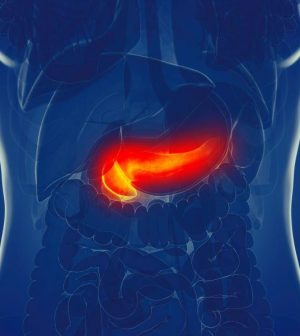- Could Your Grocery Store Meat Be Causing Recurring UTIs?
- Are You Making This Expensive Thermostat Error This Winter?
- Recognizing the Signs of Hypothyroidism
- 10 Strategies to Overcome Insomnia
- Could Artificial Sweeteners Be Aging the Brain Faster?
- Techniques for Soothing Your Nervous System
- Does the Water in Your House Smell Funny? Here’s Why
- Can a Daily Dose of Apple Cider Vinegar Actually Aid Weight Loss?
- 6 Health Beverages That Can Actually Spike Your Blood Sugar
- Treatment Options for Social Anxiety Disorder
Therapeutic Vaccine Prevents Pancreatic Cancer’s Recurrence in 3-Year Trial

A pancreatic cancer vaccine has continued to protect a small group of patients from their cancer coming back, three years after receiving the jab, a new study says.
Eight patients have not had their pancreatic cancer recur for three years after their immune systems responded to the vaccine, which is called autogene cevumeran, researchers reported Sunday at a meeting of the American Association for Cancer Research in San Diego.
Pancreatic cancer is a highly fatal disease, researchers noted. Even after successful surgery, only about 12% of patients are alive five years after diagnosis, according to the American Association of Clinical Oncology.
“Chemotherapy, radiation, targeted therapy, and current immunotherapies are also largely ineffective in pancreatic cancer, so new therapies are urgently needed for patients who face this deadly disease,” researcher Dr. Vinod Balachandran, a surgical oncologist with Memorial Sloan Kettering Cancer Center in New York City, said in a news release.
The mRNA-based vaccine teaches the immune system to identify and attack cancer cells, using 20 unique proteins exclusively present in a patient’s tumor. The vaccine is special-made for each patient, based on the specific mutations found in their cancer, Balachandran said.
The research team compared eight patients who responded to the vaccine with eight patients who didn’t. All had undergone surgery to remove their cancer.
Those who didn’t respond to the vaccine had an average recurrence-free survival rate of 13 months, results show.
But those whose immune systems did learn from the vaccine have remained cancer-free for three years, researchers said.
Researchers also found expanded levels of cancer-fighting immune cells throughout the bodies of those eight patients, results show.
The data shows that the vaccine can create cancer-fighting immune cells “with significant longevity, substantial magnitude, and durable function,” Balachandran said.
An ongoing clinical trial is testing how the autogene cevumeran vaccine works in combination with chemotherapy and the immunotherapy drug atezolizumab, compared against standard chemotherapy, Balachandran said.
The clinical trial was funded in part by Genentech and BioNTech, the developers of autogene cevumeran.
Results presented at a medical meeting should be considered preliminary until published in a peer-reviewed journal.
More information
The American Cancer Society has more on pancreatic cancer.
SOURCE: American Association for Cancer Research, news release, April 7, 2024
Source: HealthDay
Copyright © 2026 HealthDay. All rights reserved.










